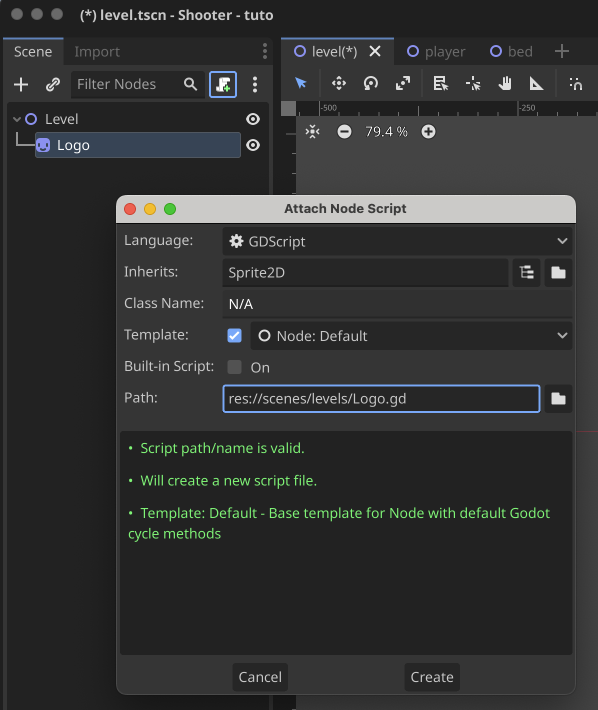Working with code - part 1
Interactivity: we need to add a script to the player. (right click on the player -> attach script).
Godot can work with multiple languages: C#, GDScript, C++.
GDScript is the default language. It's similar to Python.
Datatypes are the same as Python: int, float, string, bool, etc. No Tuples and Lists are replaced by Arrays.
Variables 2 types of variables: Variables and Constants.
var current_speed = 0
const max_speed = 100
You can change the datatype dynamically or you can force one datatype for a variable:
var a_string: String = 'test'
var a_number: int = 123
var switch: bool = true
var some_numbers: Array[int] = [1, 2, 3]
Functions are the same as Python:
func test_function(param_a: int, param_b: String) -> bool:
return true
If no return value specified, the function return a void. Like in Python, indentation assign lines of code to a function.
Flow You have if statements, while & for loops with the comparison operators (also continue & break)
Classes A script is always added to a Node. That Node is a class with default methods and attributes Adding a script to a Node2D creaters an object with a position, rotation, scale, etc. You can use code to change these values and also add new ones.
there are lots of inbuilt functions you will use, they all start with an _:
_ready() is run when a Node is added to the node tree _process() is run every frame of the game
You can target other nodes in 2 ways:
- get_node("node path")
- $node path
Start scripting

extends Sprite2D
var pos: Vector2 = Vector2.ZERO # (0,0)
const speed: int = 10
var test_scale: int = 1
# Called when the node enters the scene tree for the first time.
func _ready():
pos = Vector2(300,200)
position = pos
test_scale = 2
scale = Vector2(test_scale, test_scale)
var test_rotation = 45
rotation_degrees = test_rotation
# Called every frame. 'delta' is the elapsed time since the previous frame.
func _process(delta):
pos.x += speed
position = pos
test_scale += 1
scale = Vector2(test_scale, test_scale)